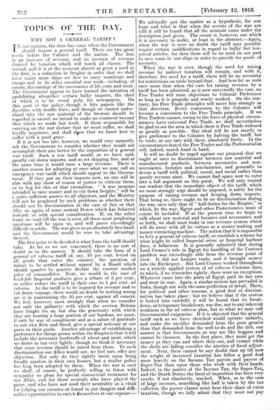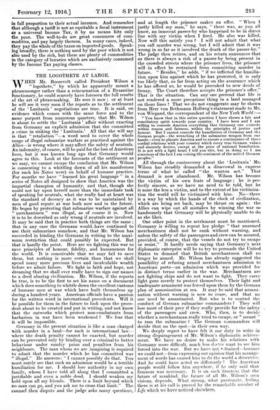TOPICS OF THE DAY,
WHY NOT A GENERAL TARIFF ?
N our opinion, the time has come when the Government IN should impose a general tariff. There arc two great needs before the Cabinet and the nation. The first is an increase of revenue, and an increase of revenue derived by taxation which will touch all classes. The second, and it is at the moment almost. as great a need as the first, is a reduction in freights in order that we shall have many more ships set. free to carry munitions and troops and to do other essential war work—including, of course, the carriage of the necessaries of life, corn and meat. The Government appear to have formed the intention of prohibiting altogether certain bulky imports, the chief of which is to be wood pulp for newspapers. On this part of the policy, though it hits papers like the. Spectator with double force, and though we cannot under- stand why the raw material of the brewers should be regarded as sacred, we intend to make no comment beyond that which we made last week. If those responsible for carrying on the war declare that we must suffer, we shall hiyally acquiesce, and shall slew that we know how to suffer with a good grace. If it is not too late, however, we would very earnestly ask the Government to consider whether they would not accomplish their aim better by the imposition of a general war tariff. Such a war tariff would, as we have said, greatly cut down imports, and so set shipping free, and at the same time it would raise a large revenue. There is another reason for adopting at once what we may call an emergency war tariff which should appeal to the Govern- ment. If they put on their imposts now, no one will be able with any show of reason or justice to criticize them, or to beg for this or that exemption. " A war measure intended to raise money and to cut down freights," will be a quite sufficient answer to all objectors, and the Ministry, will not be perplexed by such problems as whether there should not be discrimination in the case of this or that Ally, or, again, of some neutral Power which has behaved towards us with special consideration. If, on the other hand, we wait till the war is over, all these most perplexing questions will be upon us, and will prove exceedingly difficult to settle. The war gives us an absolutely free hand, and the Government would be wise to take advantage thereof.
The first point to be decided is what form the tariff should take. As far as we are concerned, there is no sort of doubt as to the answer. It should take the form of a general ad valorem tariff of, say, 10 per cent. levied on all goods that enter the country, the question of values to be settled without appeal by a Board which should quarter by quarter declare the current market price of commodities. Next, we would in the case of bond file Imperial products give a rebate of 5 per cent., or rather reduce the -tariff in their case to 5 per cent. ad valorem. As the tariff is to be imposed for revenue and to cut down tonnage, there would no doubt be nothing wrong per se in maintaining the 10 per cent. against all comers. We feel, however, most strongly that when we consider not only the gallantry with which the oversee Britons have fought for us, but also the generosity with which they are bearing a large portion of our burdens, we must, if only by way of compliment and as a salute of gratitude to our own flesh and blood, give a special welcome at our ports to their goods. Another advantage of establishing a preference for things grown within the Empire is that it will include the necessary foodstuffs of wheat and meat, which we desire to tax very lightly, though we think it necessary that some revenue should be raised from them. To such discrimination our Allies would not, we feel sure, offer any objection. Not only do they rightly insist upon being fiscally masters in their own houses, but a similar policy has long been adopted by them. When the war is over we shall, of course, be perfectly willing to listen with sympathy to pleas for special commercial treatment for our Allies, and for those neutrals who have played the game, and who have not used their neutrality as a cloak for helping our enemies or found in our dangers and diffi- cultics opportunities to enrich themselves at our expense.-- We advisedly put the matter as a hypothesis, for our hope and trust is that when the secrets of the war are told it will be found that all the neutrals come under the description just given. The caveat is, however, one which it is necessary to make, at least in the abstract.—Again, when the war is over no doubt the tariff may possibly require certain modifications in regard to bulky but low- priced articles, for then there will be no need on our part to save room in our ships in order to provide for goods of necessity.
When the war is over, though the need for raising revenue by indirect taxation will remain, and with it, therefore, the need for a tariff, there will be no necessity for restrictions on trade beyond that. And here let us note once more that when the case for raising revenue by a tariff has been admitted, as is now universally the case, no Free Trader will raise objections to Colonial Preference as long as it is properly and wisely worked. On the con- trary, his Free Trade principles will move him strongly in that direction. Every concession to the Colonies will become a concession to the Free Trade principle. If we Free Traders cannot, owing to the force of physical circum- stances, have universal Free Trade, we shall nevertheless be glad to see the area in which there is Free Trade widened as greatly as possible. Our ideal will be not merely to give preference to the Colonies by halving the tariff, but to trade, at any rate with them, absolutely freely. In the circumstances stated the Free Trader and the Preferentialist will, indeed, march hand in hand.
It will no doubt be urged against our proposal that we ought at once to discriminate between raw material and manufactured products, between necessaries and non- necessaries, luxuries and non-luxuries, and generally to devise a tariff with political, moral, and social rather than purely revenue aims. We cannot find space now to enter into a full argument on this point. We will only remind our readers that the immediate object of the tariff, which we most strongly urge should be imposed, is solely for the purpose of raising revenue and keeping down imports. That being so, there ought to be no discrimination during the war, save only that of " half-duties for the Empire," in which, by the way, Egypt and other Protectorates must of course be included. If at the present time we begin to talk about raw material and luxuries and necessaries, and so forth, we shall start leaks in our revenue system which will do away with all its virtues as a money-making and money-extracting machine. The notion that it is impossible to levy a general ad valorem tariff, or establish a scheme for what might be called Imperial oclroi or Imperial harbour dues, is fallaHous. It is generally admitted that during Lord Cromer's rule in Egypt his handling of the Customs problem was exceedingly able from the revenue point of view. It did not hamper trade, and it brought money into the Exchequer. But Lord Cromer worked throughout on a strictly applied system of ad valorem Customs dues, to which, if we remember rightly, there were no exceptions. Whatever came into the ports of Egypt paid its fair rate and went its way. Again, a similar system has prevailed in India, though not with the same perfection of detail. There, for political and other reasons, a good deal of discrimi- nation has taken place ; but we believe that if the system is looked into carefully it will be found that its break- down, or temporary breakdown, was due, not to any inherent weakness in the ad valorem plan, but to what we may call Governmental exigencies. If it is objected that the" general tariff such as we have sketched would operate unfairly, and make the sacrifice demanded from the poor greater than that demanded from the well-to-do and the rich, our answer is that Governments at war are like beggars and cannot be choosers. In the first place, they must get the money as they can and where they can, and cannot while the shells are falling consider the niceties of fiscal adjust- ment. Next, there cannot be any doubt that up till now the weight of increased taxation has fallen a good deal more heavily on the Income Tax payers and payers of Super-Tax than upon those who work with their hands. Indeed, in the matter of the Income Tax, the Super-Tax, and the Death Duties the limit of imposition has been very nearly, if not absolutely, reached. When, as in the case of large incomes, something like half .is taken by the tax collector, the poorer classes must bear their share a extra taxation, though we fully admit that they must not pay in full proportion to their actual incomes. And remember that although a tariff is not as equitable a fiscal instrument as a universal Income Tax, it by no means hits only the poor. The well-to-do are great consumers of com- modities, and pay largely thereon. In many cases, indeed, they pay the whole of the taxes on imported goods. Speak- ing broadly-, there is nothing used by the poor which is not also used by the rich, but there are plenty of commodities in the category of luxuries which are exclusively consumed by the Income Tax paying classes.



































 Previous page
Previous page